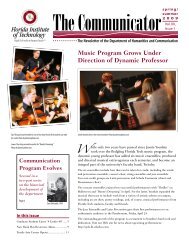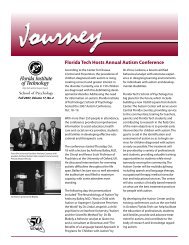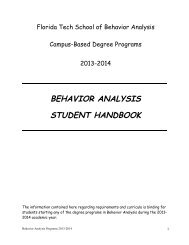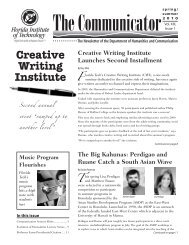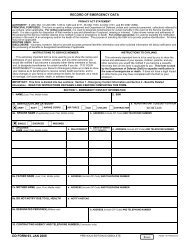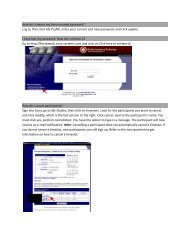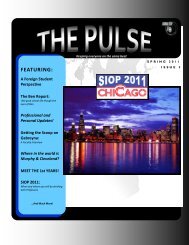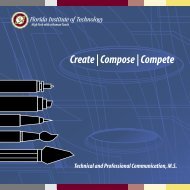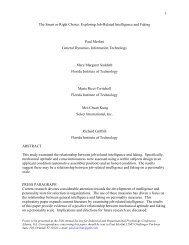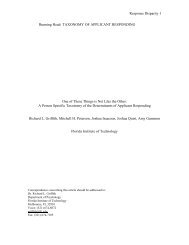Keeping everyone on the same beat.
Keeping everyone on the same beat.
Keeping everyone on the same beat.
Create successful ePaper yourself
Turn your PDF publications into a flip-book with our unique Google optimized e-Paper software.
Page 11<br />
P U L S E<br />
Tip Number 3 – READ, WRITE, READ, WRITE (and so <strong>on</strong>...).<br />
This was actually something that I (sort of) got right! I would read an article, make a summary that<br />
focused <strong>on</strong> what was related to my <strong>the</strong>sis, <strong>the</strong>n I would read ano<strong>the</strong>r <strong>on</strong>e, do <strong>the</strong> <strong>same</strong>, and c<strong>on</strong>tinued that<br />
process. Some students find it easier to read a few articles and <strong>the</strong>n try to take a bite out of writing a secti<strong>on</strong><br />
of <strong>the</strong>ir <strong>the</strong>sis. That may work, but I find it a lot easier to shorten those articles, in my own words, so I can<br />
combine <strong>the</strong>m into related secti<strong>on</strong>s and write my <strong>the</strong>sis from <strong>the</strong>re. Since <strong>the</strong> largest chunk of your <strong>the</strong>sis is<br />
<strong>the</strong> literature review, where you are supposed to show your mastery of <strong>the</strong> literature surrounding your idea,<br />
having article summaries was almost like writing your <strong>the</strong>sis. I would often just go into <strong>on</strong>e of my summaries,<br />
and copy-and-paste some of my passages straight into my literature review. What would take o<strong>the</strong>r students<br />
a few hours would <strong>on</strong>ly take me a few minutes, because of <strong>the</strong> pre-work I did when summarizing.<br />
Tip Number 4 – WORK CONSTANTLY!<br />
Although I did well with number three, I was very poor at number four (and yes, I did edit this sentence<br />
so it rhymed). We all know that <strong>the</strong> amount of work we, as graduate students, have to c<strong>on</strong>tinually do is<br />
insane. Especially during your “hell semester” (first semester of your sec<strong>on</strong>d year), when you should be rolling<br />
with your <strong>the</strong>sis, it seems like <strong>the</strong>re isn’t a minute to spare. The key is to c<strong>on</strong>stantly work. Not <strong>on</strong>ly will<br />
you be taking little bites out of your <strong>the</strong>sis, but you will not have to spend much time (if any at all) reminding<br />
yourself of where you are or where you were going with your writing. We all need breaks, and I may be <strong>the</strong><br />
greatest “break-taker” in <strong>the</strong> world, but <strong>the</strong> more little progressi<strong>on</strong>s you make, <strong>the</strong> more likely you will finish<br />
<strong>on</strong> time. Also, your <strong>the</strong>sis will probably need a lot less editing in <strong>the</strong> future if you’re not rushing through it.<br />
For instance, you w<strong>on</strong>’t need to remove an incoherent paragraph you wrote at 5am <strong>on</strong>e night when you were<br />
trying to make up time you lost because you didn’t work c<strong>on</strong>stantly...<br />
Tip Number 5 – HAVE FUN WITH YOUR THESIS!<br />
This was also <strong>on</strong>e of <strong>the</strong> few tips that I got right (I know, what a shocker!). The best way to have fun<br />
when writing your <strong>the</strong>sis is to pick a topic you really are interested in. D<strong>on</strong>’t just pick an easy idea that you<br />
heard in class or read in <strong>the</strong> “future research” secti<strong>on</strong> of an article. Think of an idea that really intrigues you.<br />
Not <strong>on</strong>ly will you be happy with yourself for thinking of your own idea, but you also will work ten times faster<br />
since you will actually be interested in <strong>the</strong> articles you need to read. I know most of your advisors will have<br />
given you this tip before, but it does bear repeating. The 80 or so pages you need to write probably seems<br />
daunting, but it is much easier to do when you are fully interested and committed to <strong>the</strong> idea you came up<br />
with. The o<strong>the</strong>r way to have fun with your <strong>the</strong>sis is to take a break. You may say this c<strong>on</strong>tradicts tip four, but<br />
it really doesn’t. All of <strong>the</strong> papers we write need time to “soak” so you may as well have some fun in <strong>the</strong><br />
meantime. So after writing a chunk, take a break and grab a beer with some friends to celebrate your accomplishment.<br />
I would not have been able to complete my <strong>the</strong>sis without taking some “Ben-time” where I celebrated<br />
what I had written so far (although some say this is why I almost did not complete it...).<br />
The five tips above are just some of <strong>the</strong> more important things to keep in mind when writing a <strong>the</strong>sis.<br />
I know my biggest issues revolved around time management. As I menti<strong>on</strong>ed, I got a late start, which made<br />
me rush through <strong>the</strong> experimental design phase, which snowballed into unforeseen issues in data collecti<strong>on</strong><br />
that led to n<strong>on</strong>-significant results. Looking back, I realized all of <strong>the</strong> time I wasted early <strong>on</strong> that I could have<br />
spent reading new articles and writing parts of my <strong>the</strong>sis. However, even if you have as many issues I had,<br />
you still learn a lot from <strong>the</strong> experience. I know its cliché, but you really learn a lot from <strong>the</strong> mistakes that<br />
you make and I think I am now better off after making <strong>the</strong>m. All of my classmates, and those before me,<br />
have had <strong>the</strong>ir own specific issues when working <strong>on</strong> <strong>the</strong>ir <strong>the</strong>sis, and we all end up better off for making<br />
<strong>the</strong>m. I am sure my fellow upperclassmen would be more than happy to share o<strong>the</strong>r tips that <strong>the</strong>y found useful<br />
if you want more advice. I hope you young’uns found this article useful and have a better “adventure”<br />
than I did!



